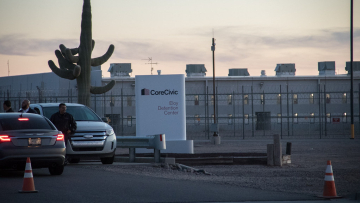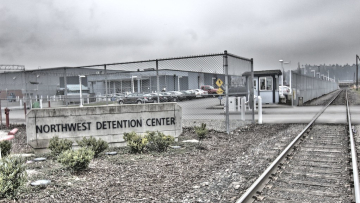European Banks Refuse OECD Offer of Mediation in Unprecedented Move Following Complaint on Private Prison Investments
Nico MacDonald, Director of Communications and Marketing, Worth Rises
Ryan Brightwell, Deputy Director & Human Rights Campaign Lead, BankTrack

Nico MacDonald, Director of Communications and Marketing, Worth Rises
Ryan Brightwell, Deputy Director & Human Rights Campaign Lead, BankTrack
Today, the Swiss National Contact Point (NCP) for the Organization for Economic Cooperation and Development (OECD) published a Final Statement on a complaint concerning Swiss-based UBS and its ongoing business links to U.S. private prison corporations CoreCivic and GEO Group, particularly those established through the bank’s passive investments. In the statement, the Swiss NCP reveals that, in an unprecedented move, UBS — alongside UK-based HSBC and Barclays, also named in the complaint — declined to participate in mediation with the complainants, civil society organizations BankTrack and Worth Rises, despite an initial assessment by the body that found the groups’ assertions had merit. The Swiss NCP recommends that UBS take steps to expand its risk screening process to passive investments, leverage relationships with index providers to pressure their adherence to human rights, and advocate for the clarification of responsible business ethics obligations regarding passive investments through a multi-stakeholder approach
Ryan Brightwell, Human Rights Campaign Lead at BankTrack, reacted:
“In refusing mediation, UBS has shown alarming indifference to their human rights responsibilities under the OECD’s guidelines for responsible business ethics. This is the first time a European commercial bank has refused mediation as part of the OECD complaint process. In doing so, they have made a powerful case for why regulations are necessary for banks to take human rights seriously.”
The initial complaint, which was accepted by the Swiss and UK NCPs, alleged that UBS, HSBC and Barclays breached the OECD principle to carry out adequate human rights due diligence with regard to their investments in CoreCivic and GEO Group, and that they failed to seek ways to prevent or mitigate adverse human rights impacts to which they are directly linked. As the largest private prison contractors operating in the U.S., CoreCivic and GEO Group often force people detained in their facilities to perform uncompensated labor under threat of solitary confinement, restricted access to legal and family visits, and deprivation of necessities, and commit other human rights violations through the conditions of their facilities.
Bianca Tylek, Executive Director of Worth Rises, said:
“Today’s statement from the Swiss NCP comes amid mounting global condemnation of President Trump’s violent immigration enforcement measures and expansion of private detention contracts. It follows years of civil society advocacy for investors to pressure private prison contractors to stop human rights abuses or else to divest from them."UBS has not denied the systematic abuses committed by these corporations, nor its financial ties to them. Instead, Europe’s seventh largest bank, with over a trillion dollars in assets, refuses accountability for its investments by painting itself as helpless and non-profit advocates as bad faith actors. Make no mistake, UBS has turned its backs on human suffering that it can undoubtedly help stop — or at a minimum, try to. Its customers should take note.”
In its Final Statement, the Swiss NCP issued three recommendations for UBS, specifically related to passive investing: (1) to include passive investments in its overall risk screening and review its existing passive investments for compatibility with the OECD Guidelines; (2) to expand engagement with index providers and reinforce its expectations with regard to human rights with them; and (3) to advocate for the clarification of responsible business ethics obligations regarding passive investments through a multi-stakeholder approach. These recommendations reinforce the international consensus that holding shares, actively or passively, establishes a business relationship under the OECD Guidelines. The Swiss NCP stated that it would follow up with the bank on progress of these recommendations in three months.
The Final Statement of the UK NCP in the case against Barclays and HSBC is still to be published.
Further context
Passive investing, such as investing through index funds, is on the rise. While many banks have ceased lending to private prison and security contractors, few have extended their divestment efforts to include these investments in private prisons. While public filings fail to disclose the full exposure of Barclays, HSBC, and UBS to CoreCivic and GEO Group, all three banks own or control at least tens of thousands of shares in each. In some cases, they own hundreds of thousands of shares, sometimes spread between various subsidiaries. Some shares are held outright while others are held through index funds, primarily U.S. small-cap index funds.
Currently, more than 90% of people in Immigration and Customs Enforcement (ICE) detention in the U.S. are held in facilities owned or operated by private prison corporations. The majority of these are owned by CoreCivic of GEO Group, whose contracts with ICE generate billions of dollars in revenue. The Trump administration’s expansion of immigration detention and deportation is highly reliant on private prison corporations, which have gloated publicly about the profit boom they expect in the coming years. CoreCivic and GEO Group are actively reopening many prisons and detention facilities that were closed due to their histories of gross human rights violations, including Dilley ICE Processing Center, making today’s decision particularly poignant.


